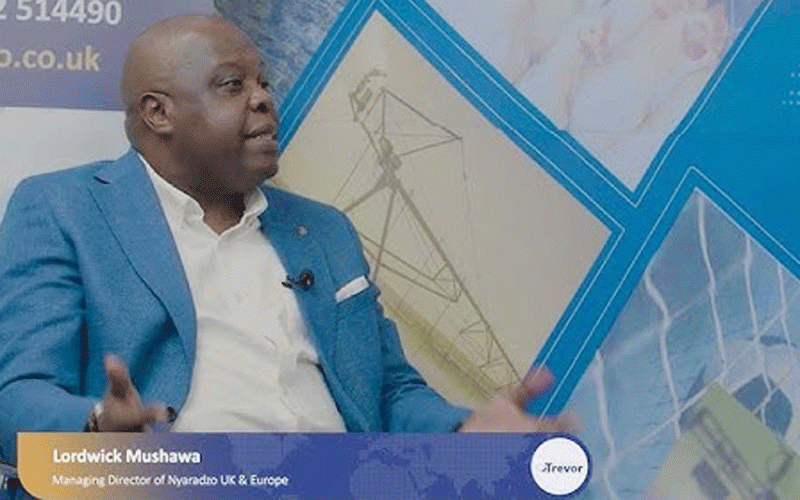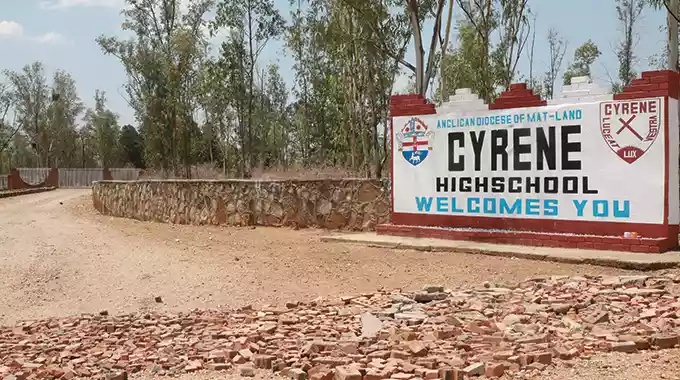
Lordwick Mushawa, the Nyaradzo Group managing director in the UK and Europe, says the funeral insurance provider has demystified death through the way it handles its business.
Mushawa (LM) appeared on the platform In Conversation With Trevor UK Series hosted by Alpha Media Holdings chairman Trevor Ncube (TN) and spoke about the firm’s approach to business.
Below are excerpts from the interview.
TN: Lordwick Mushawa, Welcome to In Conversation with Trevor.
LM: Thank you Trevor for having me on the UK series.
TN: You know we are so grateful for the partnership that we have struck and coming to the UK you guys have given us an opportunity to sit down with some of the most amazing Zimbabweans who are in the diaspora.
We enjoyed our conversations. So Lordwick and the team we are very grateful for that, thank you.
- ‘I had five jobs, but still struggled’
- Nyaradzo boss: We have demystified death
- Alice Matimba: I feel like a global citizen
Keep Reading
LM: Thank you Trevor.
TN: Talk to me about why you thought you should do this. Why do you think we should have this partnership and do this kind of thing?
LM: Well, Trevor this was not the first time we have worked with your team and the last series that we did.
We did get a lot of interest from a lot of people, and the candidates that we brought to the series were very good in terms of the production, the input and the community because I think we share the same values where we want to see Zimbabwe get better and the only people who can do that are Zimbabweans.
We think this is the right forum to tap into that Zimbabwean community so that we can all grow and get our country better.
TN: Fantastic I mean we share a vision I think, and that vision is nation building.
How better to build Zimbabwe than telling the stories of Zimbabweans from their own journeys and their stories so thank you so much for that.
I have been watching the Nyaradzo group since the group started in 2001. What an amazing journey.
You guys have deliberately built a brand that I admire and quite a lot of people admire. I want you now Lordwick to take us through the overview of the Nyaradzo group operation since 2001.
LM: Thank you Trevor for that question. Well as the name says Nyaradzo, it signifies somebody who is a comforter.
We now have added the Sahwira to mean that we are your partner.
So our founding group CEO Mr Mataranyika, he always had a vision to support his community starting with the people that he knew and before long when he left Old Mutual, his idea was to provide a company or organisation that can reach out to our Zimbabweans, especially when they have lost their loved ones.
I think his experiences during funerals were always what he talks about, about people sleeping in the car, no toilets, it's sombre, everyone is crying and his vision was to make the experience to reduce the loss or the burden for the people that would be crying.
That informed the start of Nyaradzo in 2001 and since then we have grown to a financial services unit covering things like agriculture. We are into…
TN: Before you go there, I'm going to stop you there. My first encounter with the Nyaradzo Group was seven years ago.
I lost a nephew and travelled to Bulawayo. I was still based in South Africa, so I had to travel to Bulawayo for the funeral.
I was blown away honestly by the professionalism, by the empathy of the team and I think I picked up the phone and spoke to Philip and said how did you do this, this is amazing.’
You’re mourning, you are in this very vulnerable place and you get to the Bulawayo offices, in the industrial sites and these people welcome you in such a manner that you feel part of the burden has been removed.
How have you guys been able to do that?
LM: I think our payoff line is services, strength and solution. We have said is all we want to do is provide solutions to our community, and one of those things we noticed was that during a funeral, people are at their lowest and you need to believe in someone to take care of things and this is where Nyaradzo has actually carved a place in people's hearts.
We reduce that burden, the loss and what we have done over the years is to try to demystify death to people to say look if you are burying your nephew or relative, let's look at what we have enjoyed with those people when they were alive and celebrate, turn it into a celebration.
We always get hurt when we lose the young ones, our loved ones but most of the time our culture never thought someone would actually go.
So we have said we want to celebrate people when they go and live their life and celebrate what they have achieved.
So over the years now we have seen where now our funerals are becoming a celebration of life and that's what I think you saw when you got to our parlour there in Donnington, the people there understand that you are at your lowest and we need to be your sahwiras so that we can lessen the burden, which is a contrast to what we were chatting about before we started recording our experiences.
TN: When we were young, in the townships, funerals were a sad moment, mourning was something else.
I'm trying to look for a word to describe but you know in the township the moment we got told that there was a funeral, we avoided that place.
We stopped playing music around but another thing that happened Lordwick is that if you met a funeral procession on the road, you would stop and park by the side.
If you were cycling you would get off your bike and stop and respect the person that is being carried.
That doesn't happen anymore and it's interesting, I mean we are recording in your offices and I was saying to you how you have become comfortable with the fact that death is part of life. How have you dealt with this yourself?
LM: Well I will tell you a little story. Our experience Trevor should be the same.
I grew up in Vhengere myself, a high density suburb in Rusape. so as young people when we heard that there was a funeral, to be honest we would be scared.
We would be worried asking ourselves if we were going to die as well. If mom goes there, will mom come back?
We avoided the route that passed via the cemetery because in Vhengere we had one cemetery called Silver Ball.
So we knew the route that goes there so if there was a funeral you made sure you didn't play around that route.
So a few years ago then when I became part of Nyaradzo, I remember telling Phillip that this was something that I never thought I would do, you know God forbid, today I will be here but now that I'm in the industry and I see the faces of people when they come here and we comfort them.
I believe that most of the people that work in the funeral industry just like people that run churches or religious pastors, it's a calling Trevor.
You need to have empathy, it has to come from within, and growing up from that little boy who was scared, I'm now able to stand in front of people and tell them that everything is going to be alright.
We have demystified death. We have called this place Nyaradzo House because it's not a funeral parlour. The day you guys walked in I could tell your team was going everywhere in the rooms.
I think they were expecting to find a body somewhere but now they are comfortable. I see they are making breakfast and they are all over the place. It's a home.
So what we have done as Nyaradzo in the industry is to demystify death, to say this is something which will come sooner or later, you know, you need to prepare for it through our funeral policies and our products.
TN: Do you think about death yourself?
LM: I do think about death. I was asking the team before we started recording with you that are you guys ready for death?
I have come to a point where I am ready for death. I do think about my death and I think it's a good thing to think.
TN: So in the morning you look at yourself in the mirror and say one day I'm going to be gone and there is nothing wrong with that because it's a process that we all go through. Do you think about that?
LM: Yes. I will take you to one of the books I'm reading. I know you have got a way you ask me about books but there’s this book that I read a few years ago.
It talks about living your life without fear, taking risks and emptying your head, reaching your potential and then when you look back on your last breath you say I have been here.
I have done that. I achieved this now I'm ready to go.
Most of us live an unfulfilled life where we wish that we could have been someone, we could have done this.
So those are the things that normally I think about because if you have always listened to your heart, followed your dreams, tried hard at the things you are good at because everyone has got something that they are good at but half the time when you speak to the young people or to even adults, they will tell you I wish I could actually run something.
I'm capable of doing this, but they live their life without actually fulfilling that.
So you can imagine on their deathbed you are thinking I could have run a taxi business in Bulawayo, I could have been this and that because the difference between me and the next guy is just our thought.










